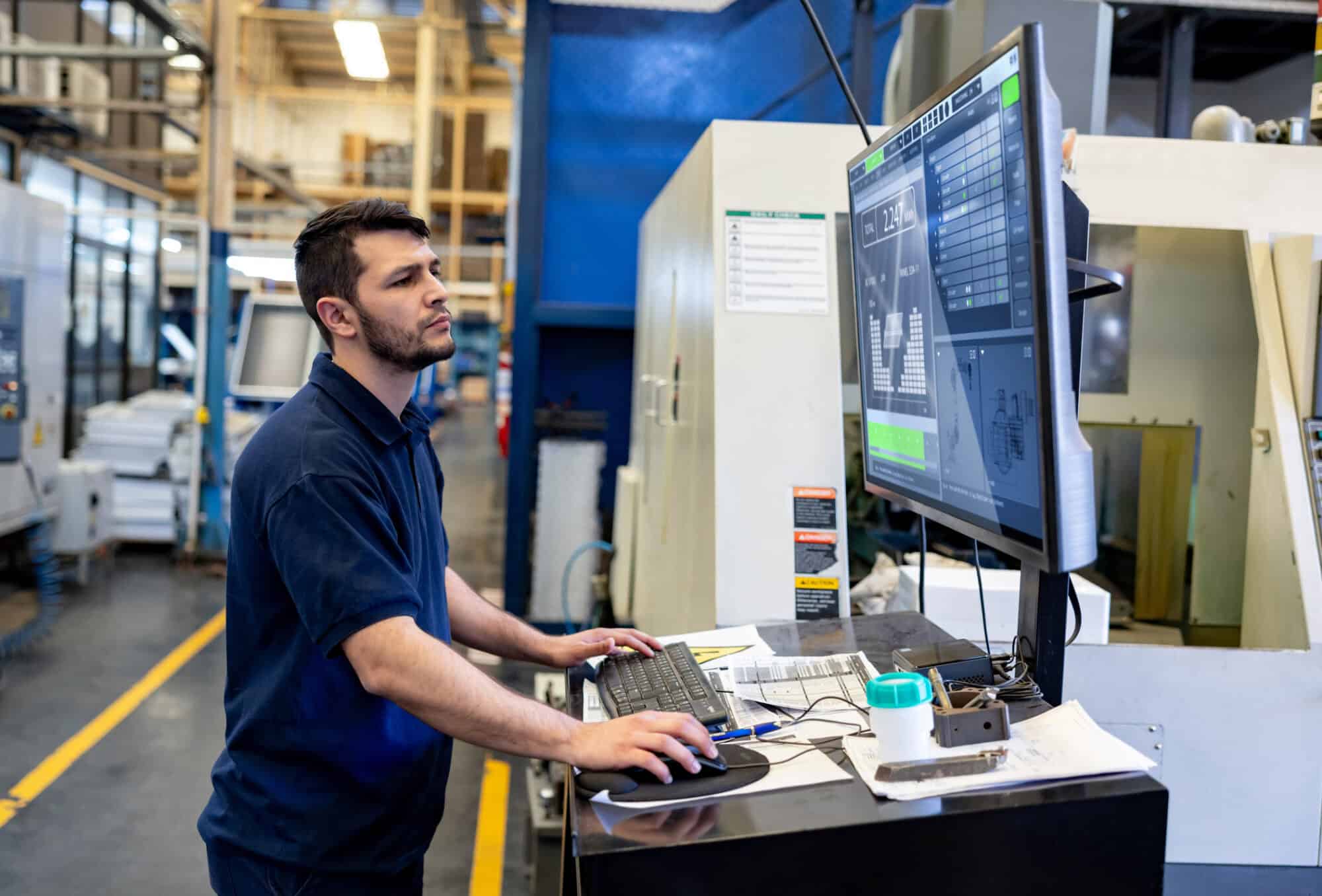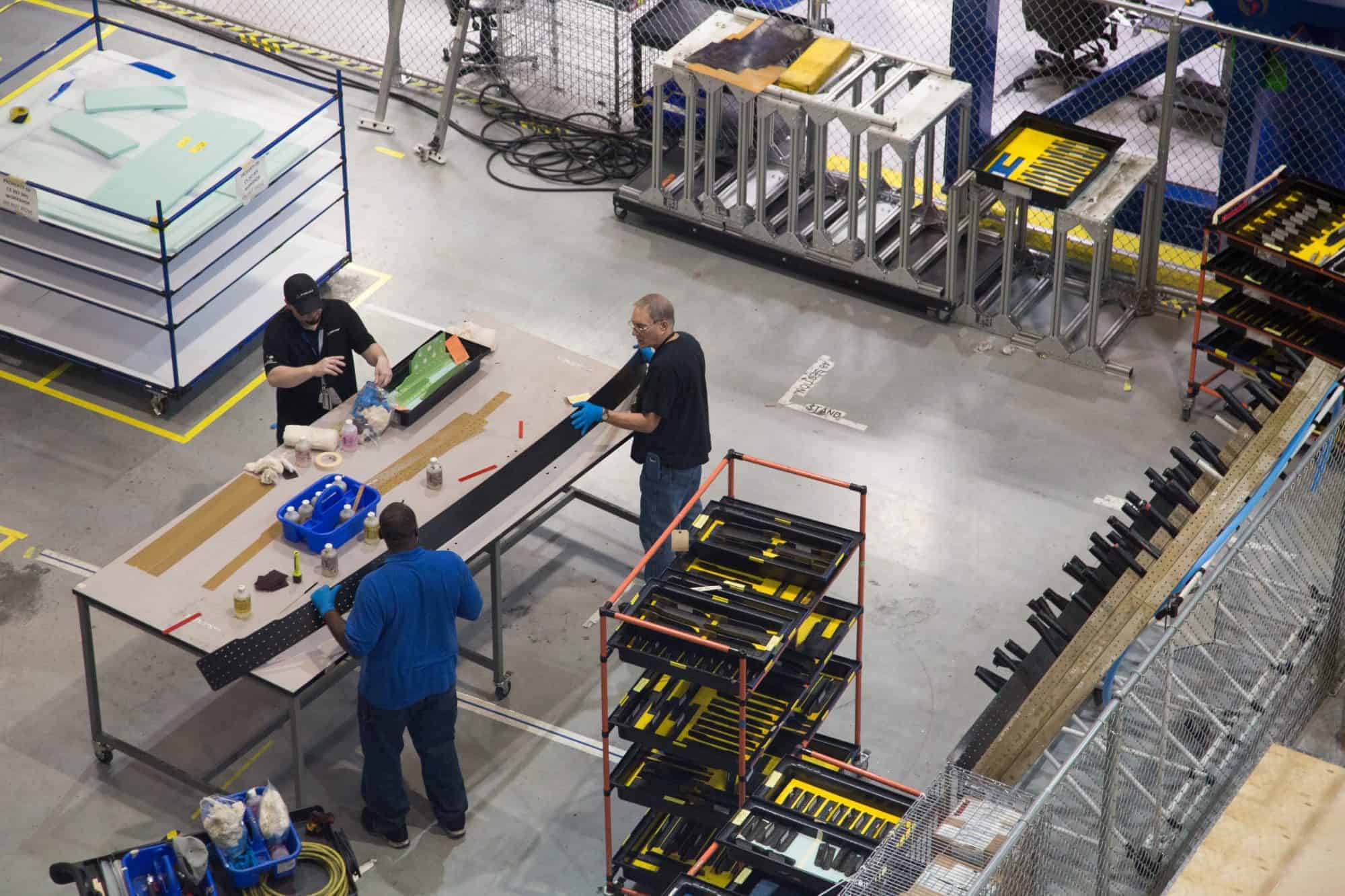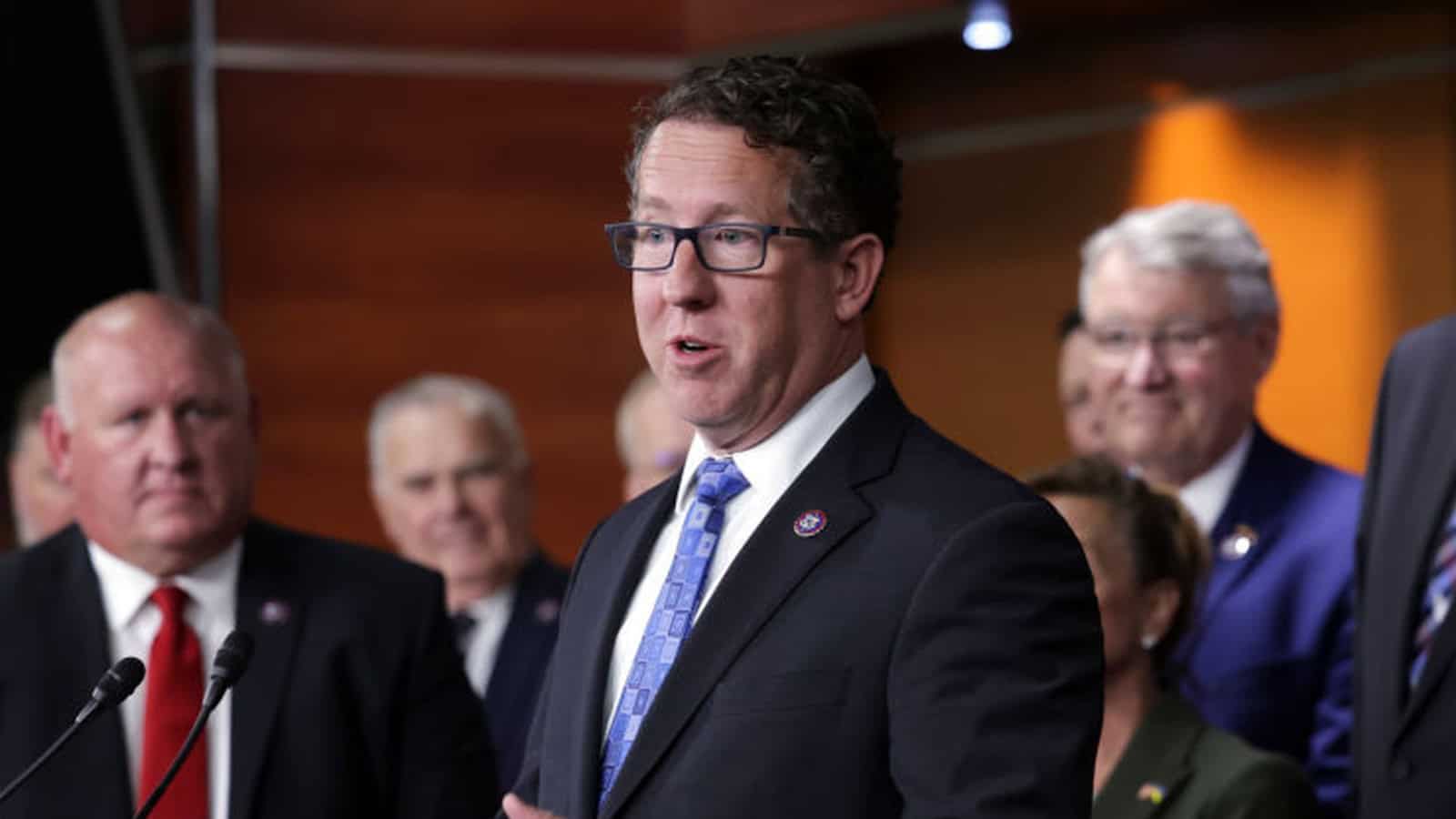NAM Study: Tax Provisions’ Expiration Will Cost U.S. Jobs, Wages, GDP

Allowing crucial pro-manufacturing tax provisions to expire will be devastating for the U.S. economy, according to a landmark EY study released today by the NAM.
What’s going on: “Pro-growth tax policies from President Trump’s 2017 tax reforms were rocket fuel for manufacturers and made the U.S. economy more competitive on a global scale,” NAM President and CEO Jay Timmons said.
But in 2022, key provisions began to expire—and additional tax reform measures are scheduled to sunset at the end of this year. If Congress doesn’t preserve these pro-growth policies, the U.S. economy will face dire consequences:
- Nearly 6 million jobs will be put at risk.
- Approximately $540 billion in employee compensation will be lost.
- U.S. GDP will be reduced by $1.1 trillion.
Manufacturing impact: The manufacturing industry will bear the brunt of this economic damage, according to the study.
- More than 1.1 million manufacturing jobs and $126 billion in manufacturing worker wages are on the line if Congress does not preserve critical pro-manufacturing policies from the Tax Cuts and Jobs Act.
The onus is on Congress: “It is the responsibility of Congress to act quickly so we can protect Americans’ livelihoods, prevent wage decreases and avoid the largest tax hike in history,” said House Speaker Mike Johnson (R-LA).
Critical players: The U.S. economy relies heavily on manufacturers, which in turn rely on competitive tax policy—and that makes these provisions’ renewal crucial, said Johnson & Johnson Executive Vice President and Chief Technical Operations & Risk Officer and NAM Board Chair Kathy Wengel.
- “[M]anufacturers—both large and small—drive innovation, create opportunity and strengthen communities across the country. … Maintaining competitive tax policy is essential to sustaining this momentum.”
What we’re doing: The NAM continues its advocacy blitz following the study’s release.
- This morning, Courtney Silver, president and owner of North Carolina–based precision machining company Ketchie and immediate past chair of the NAM’s Small and Medium Manufacturers Group, is testifying at a House Ways and Means Committee hearing on the need to make pro-manufacturing TCJA reforms permanent.
- At 4:30 p.m. EST today, the NAM will hold a press conference on Capitol Hill announcing the study’s launch. Speakers will include Timmons, Speaker Johnson, House Majority Leader Steve Scalise (R-LA), House Ways and Means Committee Chairman Jason Smith (R-MO) and Senate Finance Committee Chairman Mike Crapo (R-ID). Watch live here.
Rep. Carey Talks Tax, Innovation at Armstrong World Industries

Congressman Mike Carey (R-OH-15) recently visited Armstrong World Industries’ Hilliard, Ohio, facility to talk about innovations and tax policies critical to the manufacturing sector with company leaders, employees and local officials. Ohio Business Magazine recently recognized the Hilliard plant, which employs 175 workers, as one of the state’s top workplaces.
The tour: AWI’s Senior Vice President and General Counsel Austin So and Plant Manager Dave Muth took Rep. Carey on a tour of the plant, showcasing their energy-saving ceiling products for commercial spaces.
- Rep. Carey also met with longtime employees on the shop floor, some of whom have worked at the facility for more than 30 years.
Appreciating innovation: During the visit, AWI highlighted their innovative Templok ceiling panels, which use phase-change material technology to regulate indoor temperatures and reduce HVAC energy consumption by up to 15%.
- “These panels not only help reduce energy costs but also contribute to a greener environment,” Muth explained.
Policy needs: So stressed that policymakers are essential to American manufacturers’ competitiveness, saying, “If we want U.S. manufacturing to stay ahead internationally, we need policies that encourage innovation and allow companies like AWI to thrive here at home.”
- “The Inflation Reduction Act’s tax incentives are essential for advancing innovative energy solutions, and technologies like our Templok panels should be included among the products covered by the 48E tax credit. These incentives not only help reduce carbon emissions and energy costs but also strengthen U.S. manufacturing competitiveness by supporting groundbreaking technologies.”
Tax priorities: Rep. Carey, So and Muth also discussed upcoming tax opportunities and challenges, especially with the impending expiration of provisions in the 2017 Tax Cuts and Jobs Act.
- Rep. Carey emphasized the importance of restoring full R&D expensing to ensure manufacturers can continue to innovate. “Products like Templok show the importance of supporting investment in research and development,” he said.
- So agreed, noting that tax policy has a direct impact on AWI’s ability to reinvest in new technologies and expand its operations in Hilliard. In particular, So emphasized that “tax incentives would encourage the mass adoption of new technologies like Templok, which would create new jobs in Ohio, reduce the stress on our national electric grid and save our customers money.”
Strengthening community ties: Former Ohio TV anchor Chase Evans from the City of Hilliard joined the visit, reinforcing the importance of manufacturing to the local economy and praising AWI’s contributions to the community.
The last word: “It’s essential to create an environment where companies like Armstrong can continue to thrive and provide good-paying jobs,” Rep. Carey concluded.
Manufacturers Ready to Work with Bessent to Ensure That We Can Continue to Drive Economy Forward
Washington, D.C. – National Association of Manufacturers President and CEO Jay Timmons issued the following statement on the nomination of Scott Bessent to be the next Treasury Secretary:
“President Trump’s 2017 tax reforms were rocket fuel for manufacturing, and their transformative impact cannot be overstated. They put into place competitive policies that fueled record job creation, wage growth, capital investment and innovation.
“With the nomination of Scott Bessent as Secretary of the Treasury, we have an opportunity to build on this momentum. President Trump recently pledged at the NAM’s fall board meeting that he will make these tax cuts permanent, and Scott will play a vital role in achieving that goal.
“Scott’s deep expertise in financial markets and his dedication to fostering economic growth make him an outstanding choice to lead the Treasury Department. Manufacturers are ready to work with him to ensure that manufacturing can continue to drive the economy forward.”
-NAM-
The National Association of Manufacturers is the largest manufacturing association in the United States, representing small and large manufacturers in every industrial sector and in all 50 states. Manufacturing employs nearly 13 million men and women, contributes $2.91 trillion to the U.S. economy annually and accounts for 53% of private-sector research and development. The NAM is the powerful voice of the manufacturing community and the leading advocate for a policy agenda that helps manufacturers compete in the global economy and create jobs across the United States. For more information about the NAM or to follow us on Twitter and Facebook, please visit www.nam.org.
Preserve Tax Reform’s Pro-Growth International Tax System

The international tax system put in place by 2017 tax reform bolsters American competitiveness and supports manufacturing in the U.S.—and that’s why its provisions must be preserved, according to a new policy explainer, part of the NAM’s Manufacturing Wins campaign.
The background: Before passage of the Tax Cuts and Jobs Act, the U.S. tax code made it more costly and less efficient to invest in the U.S. Corporate profits were taxed at the 35% corporate income tax rate when repatriated to the U.S., forcing businesses to keep revenues abroad.
- Tax reform instituted a new, pro-growth international tax regime that incentivizes companies to locate their operations, intellectual property and profits here in the U.S.
The specifics: Tax reform’s international tax provisions include the following:
- A 21% corporate tax rate: Tax reform reduced the corporate rate from 35% to 21%, making “the U.S. a more attractive home for manufacturing investment.”
- The Foreign-Derived Intangible Income deduction: This deduction “reduces taxes for companies that locate job-creating, export-producing intellectual property in the U.S.”
- The Global Intangible Low-Taxed Income regime: The GILTI regime imposes a U.S. minimum tax on income earned abroad in low-tax jurisdictions.
- The Base Erosion and Anti-Abuse Tax: The BEAT applies to certain payments that shift companies’ profits abroad.
Why it’s important: Globally engaged manufacturers face the possibility of significant tax increases at the end of 2025 as key international tax provisions are scheduled to change.
- The FDII deduction will decrease, while the effective GILTI and BEAT tax rates will both increase—upsetting the balance inherent in the TCJA international tax structure and thus making it more costly and difficult for globally engaged companies to operate here in the U.S.
What’s next: In addition to maintaining or reducing the 21% corporate tax rate, the NAM is calling on Congress to prevent the FDII decrease and the GILTI and BEAT tax increases on manufacturers whose success bolsters America’s competitiveness on the world stage.
The last word: “Congress must sustain tax reform’s international tax system, including the lower corporate tax rate, in order to enhance America’s competitiveness and support manufacturers’ efforts to create jobs and grow investment here in the United States,” said NAM Vice President of Domestic Policy Charles Crain.
NAM Sees Strength for Manufacturing as Washington Transitions

With a new administration and Congress on the horizon, the NAM is signaling confidence in its ability to secure wins for manufacturing in the United States, highlighting both recent achievements and policy priorities moving forward.
“The NAM has always focused on what’s best for manufacturing in America, and our track record speaks to that,” said NAM Executive Vice President Erin Streeter. “Our approach is consistent because we know what it takes to get results.”
What we’ve delivered: With post-partisan engagement, the NAM has achieved historic policy wins across both recent administrations, including:
- Tax reform: The NAM’s advocacy helped shape the 2017 tax cuts, driving billions in savings that manufacturers have reinvested in jobs, innovation and facility upgrades.
- Regulatory certainty: The NAM has played a pivotal role in streamlining regulations, reducing compliance costs under the Trump administration and working to slow regulatory expansion during the Biden years.
- United States-Mexico-Canada Agreement: The NAM was a key advocate for USMCA, safeguarding U.S. jobs by ensuring fairer competition and greater access to key markets.
- Energy advances: NAM-backed policies have supported growth in domestic energy production, creating a more stable energy market.
- Infrastructure and CHIPS Act: The NAM was instrumental in securing the historic Bipartisan Infrastructure Law and the CHIPS and Science Act, both critical for modernizing the economy, bolstering national security and ensuring a reliable semiconductor supply.
“These wins demonstrate what we bring to the table,” Streeter said. “By staying focused on manufacturing’s priorities, we can partner effectively with the new administration and Congress to create and protect jobs and strengthen communities.”
Looking ahead: The NAM’s focus on core issues remains critical for keeping the sector competitive and resilient, Streeter continued. These issues include:
- Securing tax reform: The NAM’s “Manufacturing Wins” campaign aims to lock in key 2017 tax provisions that manufacturers rely on for stability and growth. “Tax reform has been a game-changer,” said Streeter. “Protecting that progress means more jobs and manufacturing-led growth across the country.”
- Regulatory certainty: The NAM is advocating for balanced regulations that support competitiveness. “Manufacturers thrive with clear, fair rules,” Streeter noted. “We’re making sure Washington understands the importance of regulatory stability—and the danger of excessive regulation.”
- Energy security: The NAM is working to secure reliable, affordable energy while fostering innovation in sustainability. “Energy security and grid reliability are top of mind for every manufacturer,” Streeter added. “We’re ensuring manufacturers can continue to innovate, grow and drive America forward.”
Bottom line: The NAM remains focused on advocating for policies that strengthen U.S. manufacturing. “Our success is built on trust and influence,” Streeter said. “Our members know the NAM is a constant force, with the relationships and expertise to deliver, regardless of political changes.”
In related news, President-elect Trump has named campaign manager Susie Wiles as White House chief of staff (Reuters, subscription), a choice NAM President and CEO Jay Timmons called “a powerful move to bring bold, results-driven leadership to the White House from day one.”
Q&A: Sen. Hassan on Immediate R&D Expensing

The NAM recently interviewed Sen. Maggie Hassan (D-NH) on the importance of reinstating immediate expensing for companies’ research-and-development expenditures. Here’s the full interview:
NAM: Sen. Hassan, Congress is facing a “Tax Armageddon” next year, as crucial provisions from 2017’s Tax Cuts and Jobs Act are set to expire. As a member of the Senate Finance Committee, what is your focus moving into next year’s debate?
Sen. Hassan: Next year, we will need to work to pass a tax cut package to support both American families and businesses. The package should build on the one that was negotiated in the Senate earlier this year, including a restoration of the full R&D tax deduction to support innovative businesses. The R&D tax deduction is an area where I have been particularly engaged in negotiations, and it is vital for our national security and economic competitiveness. We need to ensure that our tax policy fosters innovation, promotes the creation of good-paying jobs and keeps the United States at the forefront of technological advancement. We also need to prioritize a bipartisan expansion of the Child Tax Credit to support hardworking families and a bipartisan expansion of the Low-Income Housing Tax Credit to address our country’s housing shortage. I will continue to push for these critical measures throughout negotiations.
NAM: As you know, for nearly 70 years, manufacturers in the U.S. were able to fully deduct their R&D expenses in the year incurred. Beginning in 2022, however, manufacturers were forced to spread their deductions over several years, greatly harming our ability to grow and compete. What is Congress doing to restore immediate R&D expensing?
Sen. Hassan: I first introduced bipartisan legislation with Sen. Todd Young to restore the R&D deduction back in 2020, and we’ve been pushing for its passage since. The R&D tax deduction has wide bipartisan support—our measure supporting full R&D expensing passed 90–5 in the Senate in 2022. Recently, we had a bipartisan tax cut package that included the R&D tax deduction’s restoration, but unfortunately, it was blocked in the Senate, despite passing the House with an overwhelmingly bipartisan 357–70 vote. It’s disappointing and frustrating.
NAM: During your time as senator, you have seen how impactful R&D is for manufacturers to be able to compete on a global level. As we get closer to next year, what are you hearing from stakeholders on the need for pro-growth tax policy so American businesses can engage and grow around the world?
Sen. Hassan: The message I’m getting is clear—we can’t afford to fall behind in the global R&D race; it’s about American competitiveness and national security. Countries like China are offering massive incentives, including a 200% super-deduction for R&D. That puts American businesses at a real disadvantage, and I’m already hearing from business leaders across New Hampshire about how the expiration of the tax deduction is impacting their ability to plan for and make the investments that drive our economy forward.
There’s a critical national security component here too. We need to be at the forefront of designing, implementing and controlling new technologies, including those used for our national defense.
NAM: Thank you, Sen. Hassan. What else can NAM members do to stay engaged and be a resource for you going into next year?
Sen. Hassan: Your advocacy is crucial. I encourage NAM members to keep speaking up about the ways in which R&D and tax policy specifically impacts your businesses and communities, as well as the need for bipartisan compromise. Doing so is invaluable in shaping effective legislation and getting it across the finish line.
Sen. Hassan: We Need Immediate R&D Expensing

With a “Tax Armageddon” looming at the end of 2025, Sen. Maggie Hassan (D-NH) is gearing up to fight for manufacturers. Sen. Hassan, who introduced the bipartisan American Innovation and Jobs Act (S. 866) with Sen. Todd Young (R-IN) in 2020 and reintroduced it last year, understands the importance of restoring expired manufacturing-critical tax provisions.
What’s going on: One of Sen. Hassan’s top priorities for 2025 is reinstating immediate expensing for companies’ research and development costs.
- For nearly seven decades, manufacturers could fully deduct R&D spending in the year those expenses were incurred. But since immediate R&D expensing was allowed to expire in 2022, manufacturers have been required to amortize R&D expenses over a period of years instead.
- “The R&D tax deduction … is vital for our national security and economic competitiveness,” Sen. Hassan told us in a recent interview for the NAM’s “Manufacturing Wins” campaign, adding that she has “been particularly engaged in negotiations” on the topic. “We need to ensure that our tax policy fosters innovation, promotes the creation of [well]-paying jobs and keeps the United States at the forefront of technological advancement.”
Why it’s important: “The message I’m getting [from manufacturers] is clear: We can’t afford to fall behind in the global R&D race,” Sen. Hassan continued. “It’s about American competitiveness and national security. Countries like China are offering massive incentives, including a 200% super-deduction for R&D. That puts American businesses at a real disadvantage.”
What she’ll be doing: Though a bipartisan tax cut package that included a restored R&D tax deduction passed in the House earlier this year, the legislation stalled in the Senate. That’s only made Sen. Hassan vow to redouble her efforts in 2025.
- “[L]ooking ahead, I’m committed to working across the aisle to get this done because it’s crucial for our manufacturers, our economy and our national security,” she said.
What you can do: Manufacturer input and engagement are vital as Congress considers tax legislation next year, Sen. Hassan emphasized.
- “I encourage [manufacturers] to keep speaking up about the ways in which R&D and tax policy specifically impacts your businesses and communities, as well as the need for bipartisan compromise. Doing so is invaluable in shaping effective legislation and getting it across the finish line.”
Read the full interview here.
Q&A: Rep. Smith on Averting “Tax Armageddon”

The NAM recently interviewed Rep. Adrian Smith (R-NE) about the actions that he and congressional colleagues are taking to fight a looming “Tax Armageddon.” The full text is below.
NAM: Rep. Smith, Congress is facing a “Tax Armageddon” next year, as crucial provisions from 2017’s Tax Cuts and Jobs Act are set to expire. As a member of the House Ways and Means Committee, what is your focus moving into next year’s debate?
Smith: The 2017 cuts unleashed economic growth, promoted American business investment and benefitted workers more meaningfully than any policy reforms in a generation. Leading the Ways and Means Rural America Tax Team and as a member of the Main Street Tax Team, I am working hard to gather input from stakeholders, job creators and drivers of our nation’s growth potential. Manufacturing is an overlooked component of rural economies, and Americans know tax policy must encourage investment in their communities.
NAM: As you know, prior to 2022, businesses could deduct 30% of earnings before interest, tax, depreciation and amortization—a deduction standard known as EBITDA. A change in the tax code limits the deduction to only EBIT—excluding depreciation and amortization. This presents an added cost for businesses taking out loans to finance large capital investments in their facilities and equipment and disproportionately impacts the manufacturing sector. What are you doing to correct this policy?
Smith: American manufacturers are already suffering under inflation, a worker shortage and a sustained high-interest environment in the United States. Bipartisan legislation I have introduced, the AIM Act, would amend the U.S. tax code to increase the cap on deductible business interest to pre-2022 levels. By ensuring capital-intensive industries can deduct more of the cost of interest from their taxes, we can enhance opportunities to develop new products in America, create jobs by making those products here and then sell those products around the world.
NAM: Congressman, you were on the Ways and Means Committee during passage of the TCJA in 2017, so you know how impactful the legislation was for manufacturers to be able to compete on a global level. As we get closer to next year, what are you hearing from stakeholders on the need for pro-growth tax policy so American businesses can engage and grow around the world?
Smith: Ensuring our tax code reflects the cost of doing business is essential for American manufacturing to compete in the global market. Prior to 2017, even President Obama realized our tax code was making American businesses less competitive. The fact there have been no major corporate inversions since passage of the TCJA is a remarkable testament to commonsense policy. Businesses we have heard from widely agree on the importance of keeping these policies in place and sustaining our strong growth.
NAM: Thank you, Rep. Smith. What else can NAM members do to stay engaged and be a resource for you going into next year?
Rep. Smith: Contacting my office with your feedback and how you have been impacted by the TCJA is always welcome. Continue to share stories about why growth-centered tax policies are key to your success and how you would change course should they expire. Together, we can maximize productivity and growth through a tax code that is a net benefit to all.
Rep. Smith on Averting “Tax Armageddon”

Rep. Adrian Smith (R-NE) is fighting a looming “Tax Armageddon”—the expiration of crucial pro-manufacturing tax measures scheduled for the end of 2025. As part of its “Manufacturing Wins” campaign, the NAM recently chatted with Rep. Smith—chair of the House Ways and Means Committee’s Rural America Tax Team and a member of the committee’s Main Street Tax Team—about how he and his colleagues are working to avert the potential disaster.
Interest deductibility: One of Rep. Smith’s priorities is restoring a pro-growth standard for interest deductibility. In 2022, a new limitation took effect, setting a stricter cap on how much interest manufacturers can deduct, and thereby increasing the cost of debt financing job-creating investments.
- “Bipartisan legislation I have introduced—the American Investment in Manufacturing Act—would amend the U.S. tax code to increase the cap on deductible business interest to pre-2022 levels,” Rep. Smith told the NAM.
- “By ensuring capital-intensive industries can deduct more of the cost of interest from their taxes, we can enhance opportunities to develop new products in America, create jobs by making those products here and then sell those products around the world.”
Preserving tax reform: By restoring tax reform’s lapsed provisions—including interest deductibility—and preserving policies scheduled to expire next year, Congress can build on the success of the Tax Cuts and Jobs Act, which “unleashed economic growth, promoted American business investment and benefitted workers,” Rep. Smith said.
- “Businesses we have heard from widely agree on the importance of keeping these policies in place and sustaining our strong growth.”
Q&A: Rep. Morelle on Interest Deductibility

The NAM recently talked to Rep. Joe Morelle (D-NY) about what he and his congressional colleagues are doing to help manufacturers debt finance important projects. Below is the full text of the interview.
NAM: Rep. Morelle, Congress is facing a “Tax Armageddon” next year, as crucial pro-growth tax policies are set to expire at the end of 2025, and as you know, many have gone into effect already. What is your focus moving into next year’s debate?
Morelle: With provisions of the Tax Cuts and Jobs Act of 2017 set to expire, it is imperative that Congress acts to safeguard tax policies that support and strengthen American manufacturing. My focus remains on measures that enhance our economic resilience and competitiveness for families and small businesses alike. This commitment drives my introduction of the American Investment in Manufacturing Act, which aims to restore the deductible business interest cap to pre-2022 levels, encouraging vital domestic investment while mitigating the pressures of rising interest.
NAM: As you know, prior to 2022, businesses could deduct 30% of earnings before interest, tax, depreciation and amortization—a deduction standard known as EBITDA. A change in the tax code limits the deduction to only EBIT—excluding depreciation and amortization. This presents an added cost for businesses to take out loans to finance large capital investments in their facilities and equipment and disproportionately impacts the manufacturing sector. What are you doing to correct this policy?
Morelle: This year, I had the privilege of voting to advance the Tax Relief for American Families and Workers Act in the House of Representatives. This bipartisan legislation represents significant progress by expanding the Low-Income Housing Tax Credit, enhancing the Child Tax Credit and incorporating the AIM Act—my own legislative initiative to reinstate the EBITDA deduction standard. Reestablishing this deduction is essential to addressing the current tax code’s disproportionate burden on our manufacturing sector, which relies on loans for substantial investments in critical infrastructure and equipment. I remain committed to reintroducing the AIM Act in the upcoming Congress and to restoring the EBITDA deduction to ensure the continued strength of American manufacturing.
NAM: Correcting this policy would promote further domestic investment while helping address concerns about rising interest rates. As we get closer to next year, what are you hearing from stakeholders on the need for pro-growth tax policy so American businesses can engage and grow around the world?
Morelle: In today’s increasingly competitive global economy, American manufacturing is indispensable to expanding our workforce, enhancing competition and securing long-term economic growth. Unfortunately, the United States stands alone among OECD countries in applying an EBIT-based limitation, placing our industries at a competitive disadvantage. A return to the full EBITDA deduction would significantly enhance U.S. competitiveness and bolster economic prosperity. I am particularly proud that my district of Rochester, New York, was recently designated a Regional Innovation and Technology Hub by the Biden administration—a recognition that strengthens our community’s role in leading the manufacturing sector. As we approach the expiration of the TCJA, I am committed to championing pro-growth tax policies that uplift working families and drive innovation at both local and national levels.
NAM: Thank you, Rep. Morelle. Is there anything else you’d like to share with readers?
Morelle: As we prepare for the new Congress, I am committed to standing with American manufacturers and collaborating with NAM members to advance pro-growth solutions that drive our economy and support our shared vision.
